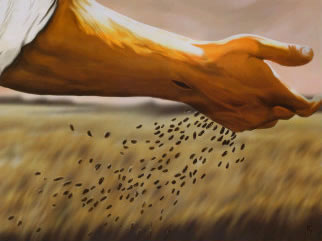 One of my favorite scripture passages–the one Eric and I actually used for our wedding ceremony–is the Parable of the Sower, from Matthew 13:
One of my favorite scripture passages–the one Eric and I actually used for our wedding ceremony–is the Parable of the Sower, from Matthew 13:
That same day Jesus went out of the house and sat by the lake. Such large crowds gathered around him that he got into a boat and sat in it, while all the people stood on the shore. Then he told them many things in parables, saying: “A farmer went out to sow his seed. As he was scattering the seed, some fell along the path, and the birds came and ate it up. Some fell on rocky places, where it did not have much soil. It sprang up quickly, because the soil was shallow. But when the sun came up, the plants were scorched, and they withered because they had no root. Other seed fell among thorns, which grew up and choked the plants. Still other seed fell on good soil, where it produced a crop–a hundred, sixty or thirty times what was sown. He who has ears, let him hear.”
But the thing is, I’ve always read this parable as a lesson of discipline: If you eat three healthy meals a day and don’t snack, you will be thin. If you and your husband invest in a regular date night, your marriage won’t go stale. If you give your kids chores to do, they won’t grow up to be whiny, spoiled brats. And if you try to pray every day, and work on your toxic thoughts, then you will have a better chance of getting through the really hard days.
Not until I read a reflection by Brother Lawrence of the Resurrection, a 17th century French soldier who later became a Carmelite friar, did I see the role of grace in all this. He writes in a meditation called “How to Produce the Hundredfold”:
We must keep our eyes fixed on God in everything we say, do, or undertake. We must make a firm resolution to overcome, with God’s grace, all the difficulties inherent in the spiritual life.
When we undertake the spiritual life we must seriously consider who we are, recognizing that we are worthy of all scorn and subject to all kinds of miseries, and a multitude of setbacks. These disturb us and make our health, our moods, our inner dispositions, and their outward manifestations changeable; in all, we are persons God wants to humble by means of a multitude of internal and external troubles and trials.
God’s help is necessary at every moment because without it the soul can do nothing. The world, nature, and evil wage war so fiercely and so relentlessly that, without this special help and this humble, necessary dependence, they would carry off the soul against its will. This seems contrary to nature, but grace finds pleasure and peace therein.
Well that’s good to know. That if my seed accidentally gets dumped on the concrete, as it often does during a day, that I am promised some help relocating it to the fertile ground, where it can grow a hundredfold, that God has my back. Sort of. As long as I’m humble about taking direction.
Image courtesy of http://paab.typepad.com/furtherandfaster/filtering.
* Click here to subscribe to Beyond Blue and click here to follow Therese on Twitter and click here to join Group Beyond Blue, a depression support group. Now stop clicking.

